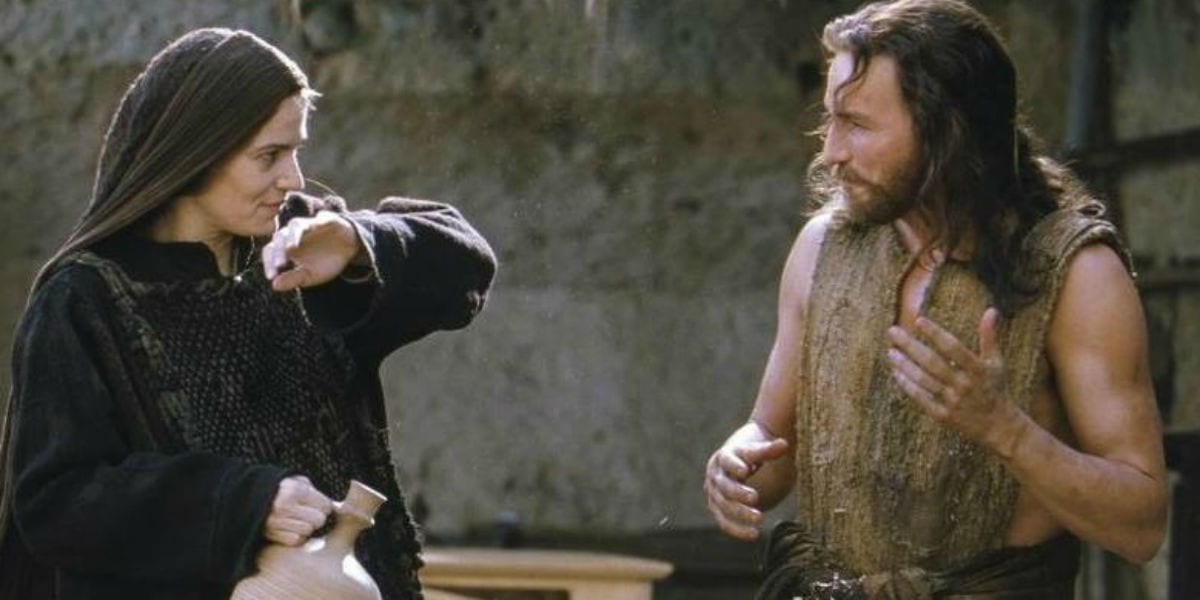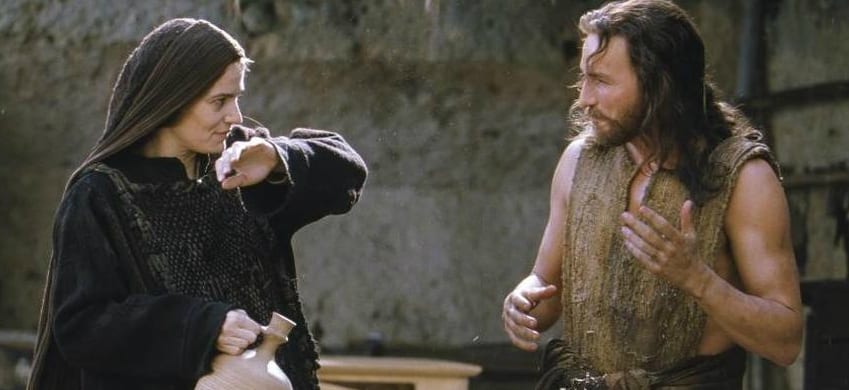Regina Caeli – Queen of Heaven, Rejoice!
The Regina Caeli, Latin for “Queen of Heaven,” is a hymn and prayer ...

This post is also available in: Spanish, Italian
The Feast of the Holy Family challenges us to grow in the virtues of piety, honor, patience, and forbearance. And to learn to laugh together.
To LISTEN to this post read by Dr. Italy, click on the play arrow on the left, directly below this paragraph.
The Passion of the Christ was the most intense movie I’ve ever seen. But there was a moment of comic relief, a flashback to a young Jesus in the back yard, building a new invention. It was the kind of table that is now a commonplace. But in a society where people reclined to dine, this table would have put the food out of reach. Mary asked him to explain his idea. He responded that one day, people would eat sitting upright, on chairs. Mary replied authoritatively, “it will never catch on!” He laughed, washed up for dinner, and playfully splashed mom with the wash water.
There is more to this scene than just a break in the action. It is a subtle way of showing that Jesus was fully human. For being human does not just mean having flesh and blood, but kith and kin. It means belonging to a family.
The pagan philosophers of Greece and Rome reflected quite insightfully upon the role of family in human life. They saw that children owed more to their parents than to anyone except God. Obviously, kids’ physical existence and basic education depend upon mom and dad. But if you think about it, children owe much more to their parents. We learn our native tongue not from our schoolteachers, but from our parents. We pick up from them, as by osmosis, attitudes, mannerisms, gestures, and habits. Like it or not, we are profoundly influenced not only by our genes, but by our family experience.
For this reason, the ancients described a special family virtue that falls under the Cardinal Virtue of Justice. Justice involves the determination to give others their due. The virtue of Piety, recognizing the extraordinary debt that children owe their parents, gives parents a unique degree of honor, respect, and affection.
Of course we have the obligation to honor and respect all human beings, since they are made in the image and likeness of God. But the degree of honor we are bound to give to others is directly proportional to the burden of responsibility that they bear for our sake. No one has been given more responsibility for us than our parents, and so we must give them more honor and respect than anyone.
This is laid out clearly in the very order of the Ten Commandments. The first three commands outline our duty to God. The very first commandment having to do with obligations to human beings is #4: “Honor your Father and your Mother.” When we are minors, this means obeying our parents. When we are adults, this means caring and providing for them in the winter season of their lives (Sirach 3:12). In his final act on the cross, Jesus did just this, entrusting his widowed mother to the care of the beloved disciple (John 19:26-27).
OK, so it was easier for Jesus to give his parents honor, affection, and respect given that Mary was immaculate and Joseph was a saint. And it was certainly easier for Mary and Joseph not to nag or provoke Jesus (Col. 3:21) based on the fact that he was the sinless Son of God.
Most households, like mine, are populated with both parents and kids who happen to be sinners. That’s why the Church gives us Col. 3: 12-21 as the second reading for the Feast of the Holy Family with its command to “forgive as the Lord has forgiven you.” A Christian family is holy not because it is sinless, but because it responds to sin with forgiveness rather than resentment. In my household, when we hurt each other, we don’t just let it slide. The offender must find it within himself to say “I’m sorry, please forgive me.” And the one offended must pronounce those liberating words: “I forgive you.” And then the matter must be forgotten.

But in addition to forgiveness, patience and forbearance are required. Sometimes it is not the sin of another that gets to us, but faults, annoying habits, or just ideas different than our own, like Jesus’ newfangled table. The family is the first place where we learn to become broader people, to celebrate, laugh and splash water at such differences rather than let them divide us.
For a 12 minute PODCAST on the Holy Family, listen to THE HOLY FAMILY AND THE HIDDEN YEARS IN NAZARETH.
For more great resources for Christmas, visit the CHRISTMAS INCARNATION section of the Crossroads Initiative Library.
This post focuses on the family virtues, especially piety, as lived out in the 21st Century. It is offered as a reflection on the Feast of the Holy Family, cycles A & B (Sirach 3:2-14; Psalm 128, Col 3:12-21, Matthew 2:13-23 and Luke 2:22-40).
34864883
Posted at 17:13h, 30 JanuaryWhere is the Pdf File For these. When you hit print it used to go to Pdf to save or Print. Now it Just goes to Print For Every Thing.Thanks. I do love these and read them all the time.
Marcellino D'Ambrosio
Posted at 17:13h, 30 JanuarySo glad you love our posts! Our old website supported PDF downloads . . . our new site only will allow you to print the document, not download a PDF. Sorry for the inconvenience.
Peggy Gahagan
Posted at 12:49h, 26 DecemberSo fabulous as always Marcellino! We too taught the exchange of words that are needed for true reconciliation after wrongdoing ~ “Please forgive me” AND “I forgive you”. It truly matters! 2nd Day of Christmas Blessings to you and Susan and your beautiful families!
Dr. Marcellino D'Ambrosio
Posted at 18:09h, 27 DecemberThanks so much, Peggy! Merry 12 days of Christmas and Happy New Year!